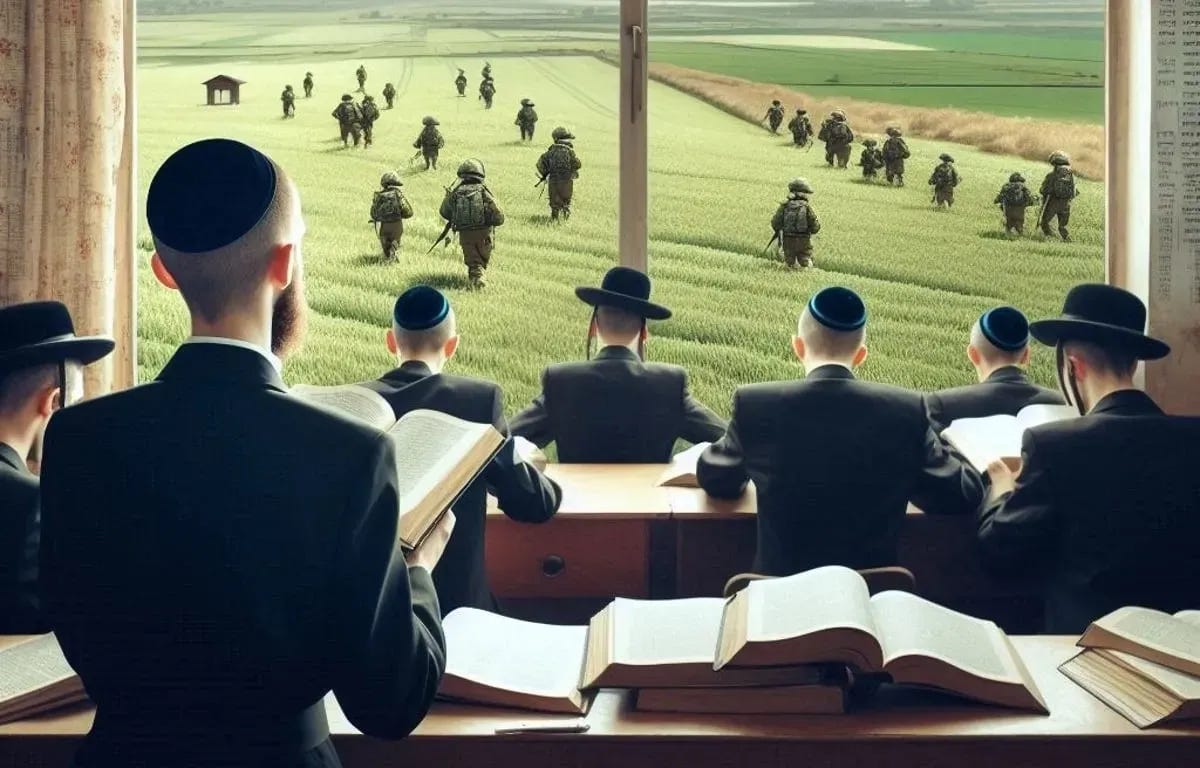No Right to Refuse
Perspective on Charedim and Army service
Several months ago, there was an episode of the Headlines podcast about achdus. There was a serious problem with how the entire discussion was about how achdus means getting along with people, without any mention of how achdus requires concern for others and mutual responsibility - specifically with regard to army service. I wrote to R. Ari Wasserman, who hosted the show, and in response he put together a new episode discussing charedim and army. You can listen to the episode at this link.
R. Wasserman interviewed some very good people who said some very good things. R. Nechemia Steinberg is at the forefront of efforts to integrate charedim into the workforce and now into the army. Rav Yosef Tzvi Rimon is a leading rabbinic figure in the dati-leumi community. However, there were two problems.
Rav Rimon says that although everyone is obligated to serve in the army, the Torah learning of charedi students is a vital protection for the nation. This is certainly not the universal view among the dati-leumi world, and I doubt that it is even the mainstream view.
There are at least four reasons why this view is problematic. First of all, the alleged sources for this in Chazal are very dubious, to say the least (as I have discussed in various posts). Second, there was no such protection in the past - for the first fifty years of the state, during the challenges of 1948 and the 1950s and 1967, there were not even thousands of people in kollel, let alone tens of thousands. Third, nobody ever believes that Torah replaces hishtadlus for any other type of protection - charedim do the exact same hishtadlus as everyone else for health and medicine, for protecting their property from attack, and so on. Fourth, if it is the case that charedi are obligated to serve in a milchemes mitzvah just like everyone else (as Rav Rimon indeed says), then their refusal to serve is a sin. And if so, what merit would there be in their Torah? It would be no more valuable than Torah learned by someone on Tisha B’Av instead of saying kinnos.
There is one another problem with the interviews. A primary focus of the discussion is about whether the army environment represents a spiritual danger to charedim. While the argument is made that in the case of students in hesder yeshivot there are minimal drop-outs from religion, the entire framework of the discussion seems to take it as a given that if the army does indeed present a spiritual danger, then it’s acceptable for charedim not to serve - which is exactly what most charedim claim. Yet this position is unacceptable. You don’t get to force other people to harm their Torah learning and livelihood and family life and risk their lives because you want to avoid a spiritually challenging situation.
Still, overall, the episode was very good. And it happened because people wrote to the host and asked for this topic to be addressed. Change happens when people speak up.




Kobi Arieli, a charedi columnist in Yisrael HaYom, made a very good point there the other day: What defines a charedi is not mitzvah observance. What the charedi leadership is scared of them losing in the army is not observance of mitzvot (as he put it, "eating bourekas without a mehadrin hashgacha or missing a Mincha"), but of *being charedi*. What they *really* don't want to see is charedim remaining religious but not part of their camp.
Don't argue with me, argue with him:
https://www.israelhayom.co.il/opinions/article/16936259
Clearly Rav Rimon shlit"a recognises the legitimacy of hashkofos other than his own, and good on him.